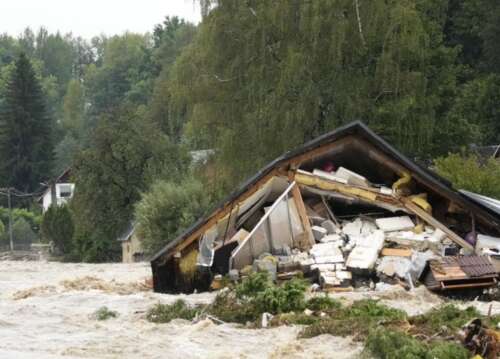Moody’s RMS Event Response estimates that insured losses from last month’s flooding in central Europe will range from $2.8 billion to $3.9 billion.
According to the financial researcher, this loss estimate includes the most affected areas in the Czech Republic, Austria, Poland, Slovakia, Hungary, Germany, and Italy. Moody’s estimates the majority of loss will be driven by the Czech Republic, Austria and Poland.
The widespread flooding was triggered by heavy and persistent rainfall that fell between September 11 and 19 across a wide area of central and eastern Europe, stretching as far as Romania.
During this period, rainfall totals in the most affected areas of Lower Austria and the Western Carpathians exceeded 15.7 inches in places.
The rainfall has been associated with a slow-moving area of low pressure over central Europe that brought warm, moist air masses from the Mediterranean and the Black Sea across to central Europe.
When this moisture met cold polar air on its way south, it precipitated, amplified by a forced uplift over the Sudetes (Czech Republic, Poland, and Germany), Carpathian (predominantly Slovakia and Romania) and Alpine mountain ranges.
Low-pressure systems with trajectories from the Mediterranean across central Europe, also known as Van Bebber Vb-type cyclones, have been responsible for some of the most severe central and eastern Europe flood events, such as in 1997, 2002, 2013, and most recently in May and June of this year.
Moody’s said these 2024 European flood events, notably the three most recent ones, again highlighted how important from a flood modelling perspective it was for the insurance industry to realistically capture key elements such as antecedent conditions, Vb-type events, cross-country correlations, flood defences, and combined fluvial and pluvial flooding.
Steffi Uhlemann-Elmer, director, model product management, Moody’s said: “This September’s flooding has been a reminder of the long history of severe and widespread summer flooding that can affect many countries simultaneously over central and eastern Europe.”
She said investments in flood defences had paid off. Given the long history of flood events across the region, substantial investments were made over time to replace and redesign existing defences and to add new risk-mitigation structures such as dams, dykes and flood retention areas.
“These measures made a substantial difference in the loss outcome for this event compared in particular to the 1997 and 2002 events,” Moody’s said.
“Most notably, the event did not lead to serious inundation of build-up areas along the major rivers, the Elbe, Danube and Oder, as the flood wave that accumulated from the mountainous regions was either capped through retention or safely propagated through cities with heightened flood defences.”
However, communities and states are still facing a large bill to repair or rebuild infrastructure and bail out uninsured households. Although flood insurance penetration has generally increased over the past two decades, take-up of home insurance that includes flood coverage is still very low in regions such as Italy, Poland, and others, or where coverage is limited such as Austria.
According to Moody’s most of the overall estimated insured losses will be retained by insurers but some reinsurance recovery is to be expected.
“Overall, 2024 marks another costly year with several flood events on the balance sheet of insurers,” the organisation said.
“Proactively managing severe weather risk and understanding correlation not only across countries but also across perils becomes ever more important.”
Source link : http://www.bing.com/news/apiclick.aspx?ref=FexRss&aid=&tid=66fc7a7d272f4b768499e2bf52f8571b&url=https%3A%2F%2Fwww.royalgazette.com%2Freinsurance%2Fbusiness%2Farticle%2F20241001%2Finsured-losses-from-european-flooding-in-the-billions%2F&c=2257012244563753763&mkt=de-de
Author :
Publish date : 2024-10-01 13:20:00
Copyright for syndicated content belongs to the linked Source.


